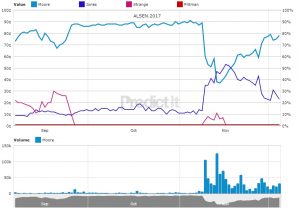Daily Comment (December 5, 2017)
by Bill O’Grady and Thomas Wash
[Posted: 9:30 AM EST] Equity markets failed to hold yesterday’s tax adjustment gains. We are mostly marking time this morning. Here is what we are watching:
Brexit problems: As we noted yesterday, it appeared PM May had resolved the Northern Ireland/Ireland border problem. Her plan was to keep Northern Ireland in the EU Customs Union, thus creating a situation where there would be no hard border between Ireland and Northern Ireland. Under normal circumstances, that decision would have held. However, because of the Tories’ poor performance in the spring elections, the government needed support from the Democratic Unionist Party (DUP), a Northern Ireland-based Unionist (Protestant) political party. The DUP opposes the action because it fears any legislation that makes it a special zone different from the rest of the United Kingdom will eventually lead to unification with Ireland. At the same time, there is great concern that a hard border between Northern Ireland and Ireland will lead to an increase in sectarian activity and put the Good Friday agreement that brought peace to Northern Ireland into question. If the DUP left the government, it is possible that the May government would fall and bring new elections. If so, a Corbyn-led Labour Party could win which would roil the U.K. economy. The other “can of worms” that has been opened is that Scotland and the City of London are suggesting that if Northern Ireland can stay in the Customs Union, they should be able to as well. Our basic position has been that the U.K. would come up with an agreement that would generally allow it to function outside the EU with close relations. This position is mostly based upon the idea that Germany wants as little disruption as possible. However, if the U.K. faces devolution pressure due to the differences between the “remain” and “leave” camps, then there is a question as to what the U.K. will look like when Brexit occurs.
Tax drama: In what should have been a procedural vote, the House, by a 222-192 margin, approved a motion to go to conference with the Senate. The drama came from the Freedom Caucus who were withholding support to gain control over spending that will be part of this week’s expected continuing resolution to fund the government. At one point, the vote was tied. Although Speaker Ryan was eventually able to get his way and appoint conference negotiators, this event shows how fragile the political consensus is at this point and how subgroups and factions gain leverage under such conditions.
More tax drama: Part of the reason equity gains fizzled yesterday was the realization that the Senate version of the tax bill, the one most likely to be the actual finished product, included a corporate version of the Alternative Minimum Tax (AMT) that was not included in the House version. The corporate AMT wasn’t much of an issue before; under a statutory rate of 35%, very few companies were caught by the AMT. However, with a statutory rate cut to 20%, suddenly a whole host of companies would find themselves subject to the AMT. Technology firms are most vulnerable to this change, which led to a selloff in that sector yesterday. Needless to say, the lobbyists are in full force to press against this measure but the revenue would need to be found somewhere else if the House version is adopted. We expect that it will, probably by a modest increase in the corporate rate. This sort of turmoil is inevitable as the “sausage is being made.”[1]
Yemen: The ex-president of Yemen, Ali Abdullah Saleh, has been killed by Houthi forces in Yemen. Saleh was allied with the Houthis against the current (or what remains of the current) leadership in Yemen. But, Saleh turned against the Houthis, relying on various tribes to protect him; that was apparently a poor decision.[2] Saleh governed Yemen for nearly four decades, deftly managing tribal and sectarian differences to keep the country intact. However, his reaction to the Arab Spring led to his ouster. Instead of going quietly into exile, he formed an alliance with the Houthis to retake power. It is unclear if it was a faction of the Houthis that executed Saleh but it is probable that coalitions of tribes and sectarian groups are now in flux which will certainly lead to increased bloodshed but also may allow the GCC countries to make gains during this period of disunity among the opposition.
Alabama election: The GOP has decided to endorse Roy Moore for the Senate after President Trump made his support a formal endorsement as well. This chart probably explains why:

After seeing the bettors turn against Moore when the allegations surrounding his dating activity surfaced, his losses failed to hold. Current betting activity shows nearly 80% likelihood that Moore will prevail later this month.
[1] Bismarck is usually attributed with the quote, “Laws are like sausages. It is better not to see them being made.” However, it appears to have been originally coined by an American poet named John Godfrey Saxe.


